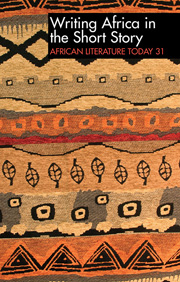Book contents
- Frontmatter
- Dedication: Chinua Achebe Joins the Ancestors
- Stop Press/ Tribute to Kofi Awoonor 1935–2013
- Contents
- Notes on Contributors
- Editorial Article
- Articles
- “Real Africa”/“Which Africa?”: The Critique of Mimetic Realism in Chimamanda Ngozi Adichie's Short Fiction
- Writing Apartheid: Miriam Tlali's Soweto Stories
- Articulations of Home & Muslim Indentity in the Short Stories of Leila Aboulela
- Ugandan Women in Contest with Reality: Mary K. Okurutu's A Women's Voice & the Women's Future
- Snapshots of the Botswana Nation: Bessie Head's The Collector of Treasures & Other Botswana Village Tales as a National Project
- Widowhood – Institutionalized Dead Weight to Personal Identity & Dignity: A Reading of Ifeoma Okoye's The Trial & Other Stories
- Feminist Censure of Marriage in Islamic Societies: A Thematic Analysis of Alifa Rifaat's Short Stories
- Diaspora Identities in Short Fiction by Chimamanda Ngozi Adichie & Sefi Atta
- Exposition of Apartheid South African Violence & Injustice in Alex la Guma's Short Stories
- Locating a Genre: Is Zimbabwe a Short Story Country?
- Mohammed Dib's Short Stories on the Memory of Algeria
- Ama Ata Aidoo's Short Stories: Empowering the African Girl-Child
- Ama Ata Aidoo: an Interview for ALT
- Reviews
Articulations of Home & Muslim Indentity in the Short Stories of Leila Aboulela
from Articles
Published online by Cambridge University Press: 05 December 2013
- Frontmatter
- Dedication: Chinua Achebe Joins the Ancestors
- Stop Press/ Tribute to Kofi Awoonor 1935–2013
- Contents
- Notes on Contributors
- Editorial Article
- Articles
- “Real Africa”/“Which Africa?”: The Critique of Mimetic Realism in Chimamanda Ngozi Adichie's Short Fiction
- Writing Apartheid: Miriam Tlali's Soweto Stories
- Articulations of Home & Muslim Indentity in the Short Stories of Leila Aboulela
- Ugandan Women in Contest with Reality: Mary K. Okurutu's A Women's Voice & the Women's Future
- Snapshots of the Botswana Nation: Bessie Head's The Collector of Treasures & Other Botswana Village Tales as a National Project
- Widowhood – Institutionalized Dead Weight to Personal Identity & Dignity: A Reading of Ifeoma Okoye's The Trial & Other Stories
- Feminist Censure of Marriage in Islamic Societies: A Thematic Analysis of Alifa Rifaat's Short Stories
- Diaspora Identities in Short Fiction by Chimamanda Ngozi Adichie & Sefi Atta
- Exposition of Apartheid South African Violence & Injustice in Alex la Guma's Short Stories
- Locating a Genre: Is Zimbabwe a Short Story Country?
- Mohammed Dib's Short Stories on the Memory of Algeria
- Ama Ata Aidoo's Short Stories: Empowering the African Girl-Child
- Ama Ata Aidoo: an Interview for ALT
- Reviews
Summary
Sudanese writer and Caine Prize recipient Leila Aboulela writes prose that captures and then lingers on experiences of migration. Homesickness pervades her writing, inviting us to consider what constitutes a home and what one will do to return there, even if only through scent and sound. In Aboulela's own words: ‘I write about what I find moving and disturbing. Culture-shock or how, again and again, the carpet gets pulled from under our feet.’ In her short stories ‘The Ostrich’ (1997), ‘The Museum’ (2000), and ‘Missing Out’ (2010), Aboulela makes familiar and demystifies the experiences of Muslim women as they migrate from Sudan to the UK. In fact such, she produces similar work to fellow post-nationalist writers. In her short stories, she lifts the limitations on writing in and about the nation state by globalizing the African experience, while at the same time individualizing it. Aboulela's characters long for highly personalized and intimately constructed notions of home. Her stories reflect the general path on which the African short story writer is moving, reaching toward an expression of the African experience that is plural rather than singular, familiar rather than exotic and other, relevant and central rather than token and peripheral. This essay examines the ways in which Aboulela's female Muslim characters articulate their notions of faith and home as a liberating practice, and, as a result, how Aboulela participates in a new iteration of the African short story.
- Type
- Chapter
- Information
- Writing Africa in the Short Story , pp. 40 - 51Publisher: Boydell & BrewerPrint publication year: 2013

